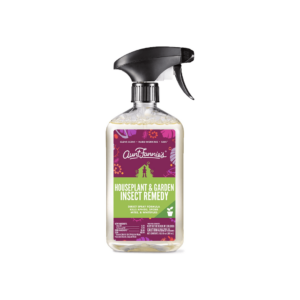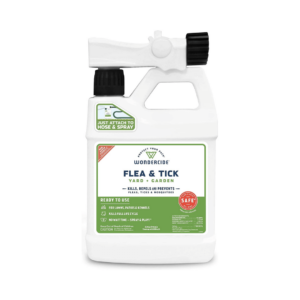No one likes unexpected pests in, on, or around the house! Ants, roaches, spiders galore – say no more. Here are some more natural pest control remedies for indoors and outdoors (including in your garden). How can you naturally keep pests away from your home? Are there non-toxic alternatives to insecticides (that actually work)?
Keep reading to learn more. Let’s tell those pests to buzz off!
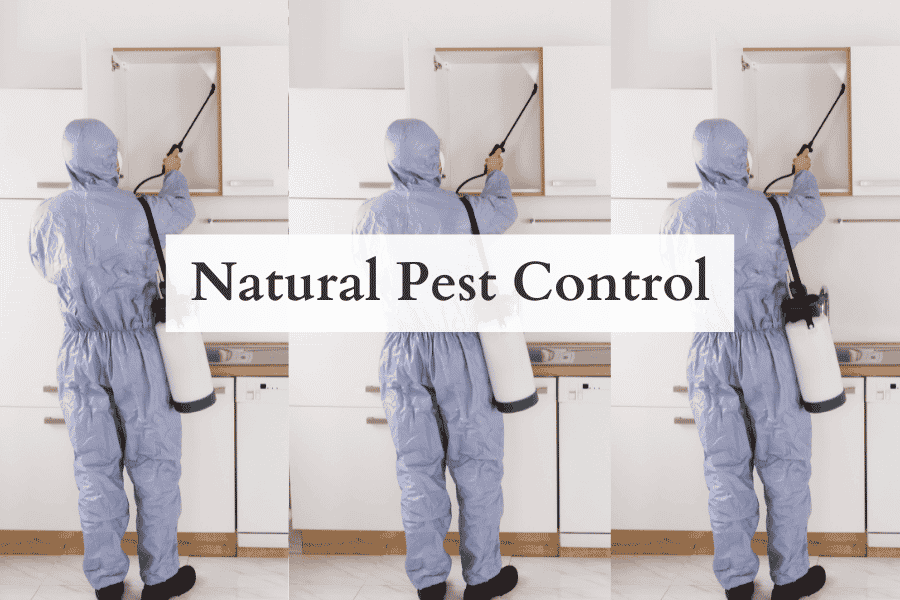
Note: This article contains affiliate links, meaning In On Around will make a small commission at no additional cost to you. This helps me maintain the site. As always, I value full transparency & only work with brands I love and trust.
14 Ways To Naturally Keep Insects Away
There are many natural methods to deter pests from entering your home! Instead of jumping straight to potentially toxic insecticides, try some of these more natural pest control methods.
1 – Food-Grade Diatomaceous Earth
- Sprinkling diatomaceous earth powder around entryways can help destroy bug exoskeletons.
- Reminder: don’t inhale diatomaceous earth powder – it can irritate your lungs if handled incorrectly.
2 – Dish Soap With Oil
- Soapy water will suffocate bugs, especially ants. Note: it evaporates in the heat, so if you’re using it in your garden, apply it at night or in the early morning.
Opt for more natural pest control methods.
3 – Coffee Grounds
- Sprinkling used coffee grounds around the outside of your home can dissuade pests from entering. Most critters don’t like the smell!
4 – Citrus Peels
- Rubbing fresh citrus peels on doorways, windowsills, and bookshelves can help repel ants, spiders, and mosquitos (plus it smells amazing)!

5 – White Vinegar or Apple Cider Vinegar
- Vinegar helps to destroy ant pheromones which throw them off their tracks. Cleaning your house (like your kitchen and bathrooms) with diluted vinegar can deter bugs.
6 – Cornmeal
- Ants love cornmeal, but they can’t properly digest it. This will likely take a couple of days, but when the ants go back to their colony, they likely won’t come back.
7 – Hot Chili Pepper Spray
- Cayenne pepper or hot peppers are naturally pest repellants.
- Be very careful not to inhale this – it can cause respiratory distress when used incorrectly. Definitely avoid getting it into your eyes – ouch!
8 – Beer
- Slugs love beer! Making a beer trap around your house or in the garden can help trap nearby slugs.
9 – Cinnamon
- Can help deter ants from entering the home. Great around entryways – ants hate cinnamon!
10 – Salt
- Finely ground salt can help to treat fleas (it’s dehydrating). Sprinkle on carpets, leave for a couple of days, then vacuum thoroughly.
- To learn more about the best salt brands, check out: What Are The Healthiest Salt Brands? Minerals In Salt 101
11 – Onion & Garlic
- This pungent vegetable helps to scare off unwanted pests. Garlic juice smells very strong, so best to use it outside.
- These are both great to plant outside since they act as natural insect repellents.
12 – Herbs
- Mint, lemongrass, lavender, and citronella plants can all divert certain bugs. Planting these around doorways and windowsills can potentially help stop pests from entering.
- Basil is also great on the patio to scare off flies.
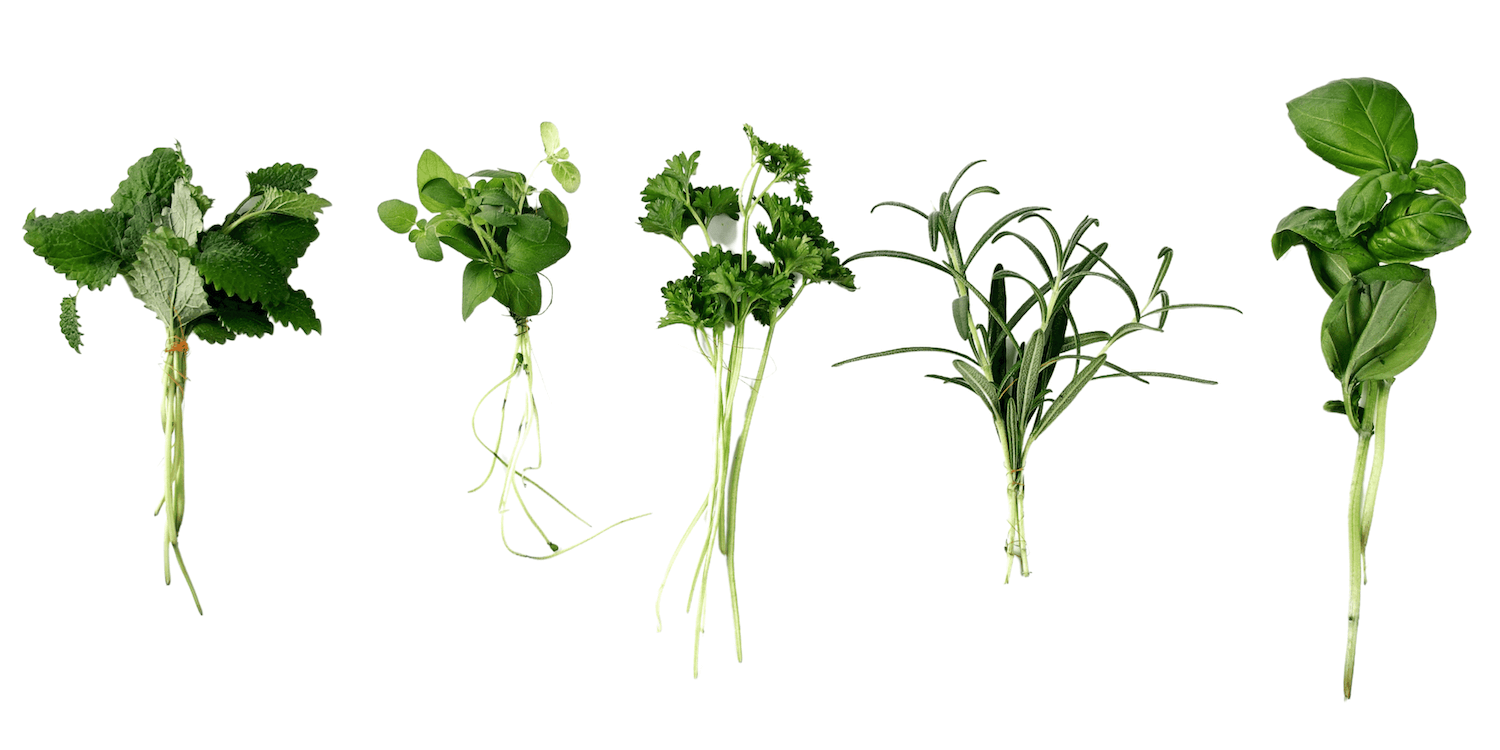
13 – Essential Oils
- Eucalyptus oil – for flies
- Peppermint oil – for spiders
- Rosemary oil – for fleas
- Fresh rosemary is great to add to outdoor campfires to scare off mosquitos! Gone are the days of bug bites while roasting s’mores or sitting around the campfire.
- Clove oil – for ants, cockroches, crickets, flies, spiders & more.
- Diffuse lavender & geranium oil, which was shown in a 2009 study to repel mosquitos by 93% indoors and 58% outdoors. Take caution if pregnant or particularly have sensitive skin. [1]
- Use extra caution with essential oils around pets and kids – they can be toxic at incorrect dosing.
Important note: many essential oils & pest control solutions can be toxic to pets.
14 – Neem Oil
- Use this only in moderation.
- Neem oil is a natural biopesticide and fungicide that comes from the neem tree. It’s low-tox, however, some studies have linked it to altered fertility in men and women. [2, 3] Studies are very limited.
- If using neem oil on organic produce, wash thoroughly before consuming. Avoid when pregnant or breastfeeding.
Gardening Tips To Deter Pests
There are a couple of things you can do to deter pests from your garden or yard! To start, focus on companion planting, meaning interplant species that benefit one another and regularly rotate crops. This helps to build healthy organic garden soil which encourages beneficial bugs to flourish. Pulling out dead or weak plants can also encourage healthier soil and dissuade nasty pests from invading.
Pulling off bugs by hand, creating barriers around your home & garden, and trimming back shrubs or bushes close to your home siding can also prevent infestation.
Seaweed mulch has also been shown to be helpful. It contains trace minerals that can help promote plant development and repel slugs. Worth a try if you’re struggling with deterring pests!
Are Ultrasonic Bug Killers Safe?
Ultrasonic bug zappers use ultrasonic sound waves to deter bugs. Sound waves of 20 kHz or higher are considered ultrasonic. Oftentimes, humans can’t hear frequencies over 16 kHz. Most people claim that ultrasonic sound waves have no impact on human health, however, studies are very limited.
Ultrasonic Study
A 2016 study said: “early studies reported hearing threshold shifts, nausea, headache, fatigue, migraine, and tinnitus, but there is insufficient research on human subjects.” [4, 5]
Ultrasonic technology is still unclear, so best to avoid it whenever possible, especially if you have pets in the home (since their hearing is much more sensitive).
Best Indoor Pest Control Brands
Ditch the nasty toxic insecticides and opt for these instead! As always, use in moderation and with caution, especially around pets or small children.
- Aunt Fannie’s Ant Spray
- Ingredients: Rosemary Oil 0.5%, Water, Soap, Glycerin
- Aunt Fannie’s Insect Spray
- Ingredients: Clove Oil, Cottonseed Oil, Water, Soap Glycerin, Myristic Acid, Potassium Oleate, Potassium Stearate
- Wondercide Bug Yard Spray
- May help with controlling fleas, ticks, and mosquitos
- Ingredients: Active: Cedarwood Oil 12.63%, Sesame Oil 2.73%, Sodium Lauryl Sulfate* 1.09%. Inert Ingredients** 83.55%, Total: 100% *Derived from Plants, Inert: **Water, Glyceryl Monooctanoate, Soap, Decanoic acid, Monoester with 1,2,3-Propanetriol
- Sunday Lawn Care
- They offer Mosquito Control Spray, Ant Killer, Tick Spray, and more. Both indoor & outdoor products are offered – make sure you’re using it for the right purpose.
- Excellent brand that uses soy protein, iron, seaweed, molasses, and other clean ingredients to tackle pests & lawn care.
- Electric Bug Zapper
- The blue light attracts the bugs and kills them upon impact. Can work with fruit flies, gnats, mosquitos, moths, etc…
- Downside: it can injure or kill most insects, even beneficial ones like honeybees & dragonflies.
- Fly traps or sticky traps
- Avoid traps that have a strong scent, especially indoors!
Of course, keeping a clean crumb-free home is one of the best ways to prevent attracting bugs in the first place. Don’t forget to vacuum, dust, and sweep regularly!
For more house cleaning tips, check out: 11 Natural Cleaning Products & Printable Spring Cleaning Checklist
Homemade DIY Insecticide
If you’d rather make a homemade insecticide, look no further! These can be used on plants to control any unwanted pests:
- 2 teaspoons castile soap + 1 gallon warm water + 1-4 tablespoons neem oil
- 1 cup vegetable oil + 1 tablespoon soap. Add 2 tablespoons of mixture to 1-quart water when ready to use & shake thoroughly.
- 1 tablespoon castile soap + 1 quart water
- 2 pureed garlic bulbs + 1/2 cup vegetable oil + 1 teaspoon soap
If you’re looking for a low-tox bug spray, read this article: Your Summer Guide To The Best Non-Toxic Bug Spray.
Final Thoughts – Organic Insecticides
As you can see, there are many natural pest solution options available to you. While some of these may not be as immediate as synthetic insecticides, they can be just as effective when given the proper amount of time. Give them a try!
Protecting your family’s health is of utmost importance. Don’t expose yourself to unnecessary insecticides!
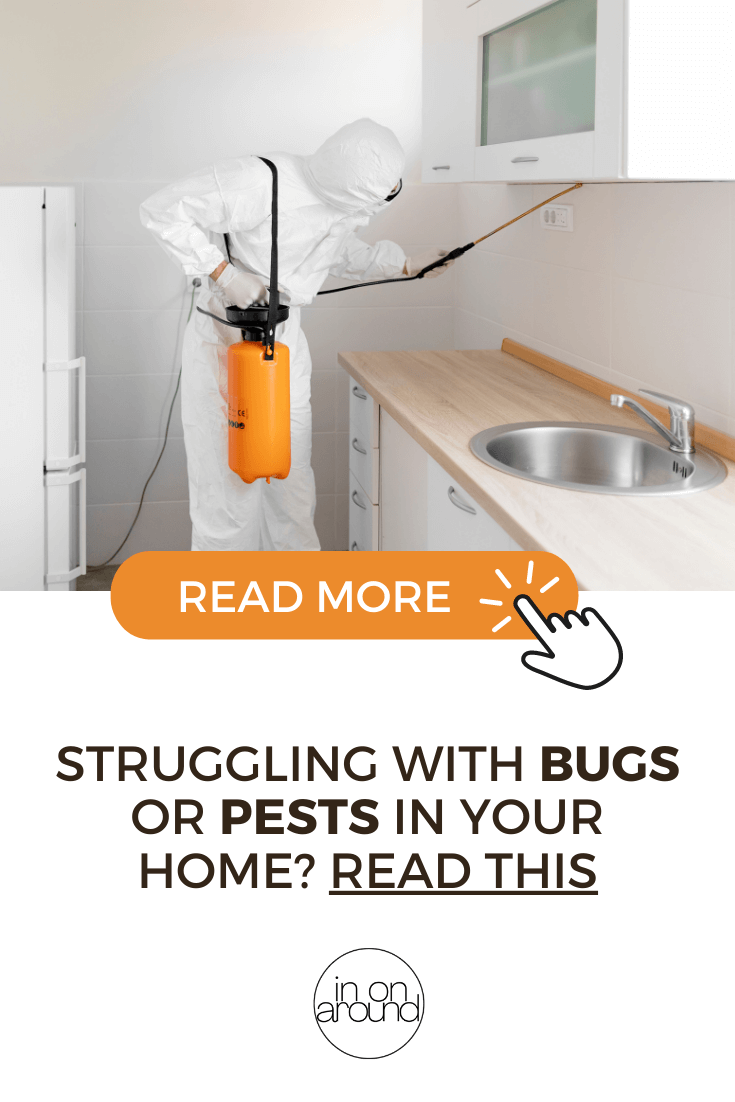
Frequently Asked Questions – Natural Remedies For Pest Control
Click on the below FAQs to learn more about organic natural pest control.
Does Diatomaceous Earth Kill Bugs?
Can Soap Kill Bugs?
Can Salt Kill Fleas?
Do Natural Insecticides Work?
How do you stop unwanted pests?
Let me know your thoughts in the comments below!
You can watch our web story here.
xoxo,

Want to read more? Check out my other articles here!
Information from: Clemson, Treehugger, Bobvila, The Daily Gardener, Organic Pest Control NYC, Common Sense Home, Earth Easy, Nature’s Nurture, Family Handyman, All About Gardening, Greener Choices, Health Belgium, Thanos Home
Copyright In On Around LLC 2022 ©. The statements made on this website have not been evaluated by the FDA (U.S. Food & Drug Administration). They are not intended to diagnose, treat, cure, or prevent any disease. The information provided by this website should not be used as individual medical advice and you should always consult your doctor for individual recommendations and treatment. The information contained in this site is provided on an “as is” basis. Related to this site, there are no guarantees of completeness, accuracy, usefulness, or timeliness. In On Around LLC assumes no responsibility or liability for any errors or omissions in the content of this site.


